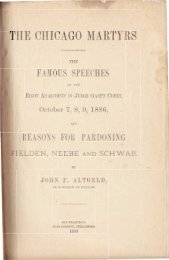- Page 2: UNIVERSITY OF ILLINOIS LIBRARY AT U
- Page 8 and 9: PHILOSOPHY From a Copley Print ...
- Page 10 and 11: From a L,). Copyri,; », Publishers
- Page 12 and 13: COPYRIGHT, 1926, BY ALVIN V. SELLER
- Page 15: THE LOEB-LEOPOLD CASE
- Page 18 and 19: The Loeb-Leopold Case After the boy
- Page 20 and 21: The Loeb-Leopold Case PION written
- Page 22 and 23: The Loeb-Leopold Case Babe, on the
- Page 24 and 25: The Loeb-Leopold Case you are not a
- Page 26 and 27: The Loeb-Leopold Case a most unique
- Page 28 and 29: The Loeb-Leopold Case identificatio
- Page 30 and 31: The Loeb-Leopold Case that concepti
- Page 32 and 33: The Loeb-Leopold Case Dr. Ghceck: B
- Page 36 and 37: The Loeb-Leopold Case A. It was a d
- Page 38 and 39: The Loeb-Leopold Case been an over-
- Page 40 and 41: The Loeb-Leopold Case that wants to
- Page 42 and 43: A. Yes, sir. The Loeb'Leopold Case
- Page 44 and 45: The Loeb-Leopold Case tain emotiona
- Page 46 and 47: The Loeb'Leopold Case Judgment, as
- Page 48 and 49: The Loeb-Leopold Case tion of the l
- Page 50 and 51: The Loeb-Leopold Case found guilty
- Page 52 and 53: The Loeb-Leopold Case Following are
- Page 54 and 55: The Loeb-Leopold Case whether those
- Page 56 and 57: The Loeb-Leopold Case They planned
- Page 58 and 59: The Loeb-Leopold Case There is a yo
- Page 60 and 61: The Loeb-Leopold Case Anderson did
- Page 62 and 63: The Loeb-Leopold Case January i6, 1
- Page 64 and 65: The Loeb-Leopold Case In submitting
- Page 66 and 67: The Loeb-Leopold Case fort, and who
- Page 68 and 69: The Loeb-Leopold Case Speech of Jos
- Page 70 and 71: The Loeb-Leopold Case name was Maso
- Page 72 and 73: The Loeb-Leopold Case taken from th
- Page 74 and 75: The Loeb-Leopold Case after strikin
- Page 76 and 77: The Loeb-Leopold Case sible that th
- Page 78 and 79: The Loeb-Leopold Case That morning
- Page 80 and 81: The Loeb-Leopold Case get the money
- Page 82 and 83: The Loeb-Leopold Case And after goi
- Page 84 and 85:
The Loeb-Leopold Case The lawyer wa
- Page 86 and 87:
The Loeb-Leopold Case he said, " th
- Page 88 and 89:
The Loeb-Leopold Case to. He said t
- Page 90 and 91:
The Loeb-Leopold Case refused to ge
- Page 92 and 93:
The Loeb-Leopold Case was unable to
- Page 94 and 95:
The Loeb-Leopold Case Darrow walks
- Page 96 and 97:
The Loeb-Leopold Case fidence in ou
- Page 98 and 99:
The Loeb-Leopold Case in aggravatio
- Page 100 and 101:
The Loeb-Leopold Case A person with
- Page 102 and 103:
The Loeb-Leopold Case Why should th
- Page 104 and 105:
The Loeb-Leopold Case that you cann
- Page 106 and 107:
The Loeb-Leopold Case toms of insan
- Page 108 and 109:
The Loeb-Leopold Case dence of ment
- Page 110 and 111:
The Loeb-Leopold Case a philosophy
- Page 112 and 113:
The Loeb-Leopold Case being the res
- Page 114 and 115:
The Loeb-Leopold Case lastic acquis
- Page 116 and 117:
The Loeb-Leopold Case was approachi
- Page 118 and 119:
The Loeb-Leopold Case becomes older
- Page 120 and 121:
The Loeb-Leopold Case Mr. Bachrach:
- Page 122 and 123:
The Loeb-Leopold Case were away fro
- Page 124 and 125:
Your Honor: IT The Loeb-Leopold Cas
- Page 126 and 127:
The Loeb-Leopold Case cause he knew
- Page 128 and 129:
The Loeb-Leopold Case cool, premedi
- Page 130 and 131:
The Loeb-Leopold Case death, but th
- Page 132 and 133:
The Loeb-Leopold Case estimating wh
- Page 134 and 135:
The Loeb-Leopold Case Did they need
- Page 136 and 137:
The Loeb-Leopold Case voice of the
- Page 138 and 139:
The Loeb-Leopold Case According to
- Page 140 and 141:
The Loeb-Leopold Case outcasts, wit
- Page 142 and 143:
The Loeb-Leopold Case is the last t
- Page 144 and 145:
The Loeb'Leopold Case of them; he h
- Page 146 and 147:
The Loeb-Leopold Case me that the b
- Page 148 and 149:
The Loeb-Leopold Case less bring im
- Page 150 and 151:
The Loeb-Leopold Case it there for
- Page 152 and 153:
The Loeb-Leopold Case coming with t
- Page 154 and 155:
The Loeb-Leopold Case thing because
- Page 156 and 157:
The Loeb-Leopold Case scarcely find
- Page 158 and 159:
Th& Loeb-Leopold Case who perhaps c
- Page 160 and 161:
The Loeb-Leopold Case training. The
- Page 162 and 163:
The Loeb-Leopold Case knowledge you
- Page 164 and 165:
The Loeb-Leopold Case Now, your Hon
- Page 166 and 167:
The Loeb-Leopold Case from his chai
- Page 168 and 169:
The Loeb-Leopold Case friends and t
- Page 170 and 171:
The Loeb-Leopold Case this grow and
- Page 172 and 173:
The Loeb-Leopold Case us look at th
- Page 174 and 175:
The Loeb-Leopold Case by the influe
- Page 176 and 177:
The Loeb-Leopold Case his dreams an
- Page 178 and 179:
The Loeb-Leopold Case or judge shou
- Page 180 and 181:
The Loeb-Leopold Case Your Honor, a
- Page 182 and 183:
The Loeb-Leopold Case which was a c
- Page 184 and 185:
The Loeb-Leopold Case He believed i
- Page 186 and 187:
The Loeb-Leopold Case developed pub
- Page 188 and 189:
The Loeb-Leopold Case the masters,
- Page 190 and 191:
The Loeb-Leopold Case at a certain
- Page 192 and 193:
The Loeb-Leopold Case lover. Withou
- Page 194 and 195:
The Loeb-Leopold Case fact, that he
- Page 196 and 197:
The Loeb-Leopold Case Hoping not to
- Page 198 and 199:
The Loeb-Leopold Case boys who had
- Page 200 and 201:
The Loeb-Leopold Case No man has re
- Page 202 and 203:
The Loeb-Leopold Case go on saying,
- Page 204 and 205:
The Loeb-Leopold Case age at which
- Page 206 and 207:
The Loeb-Leopold Case guilty before
- Page 208 and 209:
The Loeb-Leopold Case the poor boy,
- Page 210 and 211:
The Loeb-Leopold Case teen, or sixt
- Page 212 and 213:
The Loeb-Leopold Case Judge Crowe a
- Page 214 and 215:
The Loeb-Leopold Case world had not
- Page 216 and 217:
The Loeb-Leopold Case Now hollow fi
- Page 218 and 219:
The Loeb-Leopold Case and women who
- Page 220 and 221:
The Loeb-Leopold Case So I be writt
- Page 222 and 223:
The Loeb-Leopold Case He followed h
- Page 224 and 225:
The Loeb-Leopold Case did not try.
- Page 226 and 227:
The Loeb-Leopold Case Dr. White poi
- Page 228 and 229:
The Loeb-Leopold Case ceived eviden
- Page 230 and 231:
The Loeb-Leopold Case contrary. So
- Page 232 and 233:
The Loeb-Leopold Case lating a supe
- Page 234 and 235:
The Loeb-Leopold Case a more or les
- Page 236 and 237:
The Loeb-Leopold Case usual; there
- Page 238 and 239:
The Loeb-Leopold Case in jail to Na
- Page 240 and 241:
The Loeb-Leopold Case as criminals,
- Page 242 and 243:
The Loeb-Leopold Case some brains t
- Page 244 and 245:
The Loeb-Leopold Case a liberal edu
- Page 246 and 247:
The Loeb-Leopold Case have the dece
- Page 248 and 249:
The Loeb-Leopold Case siderable abo
- Page 250 and 251:
The Loeb-Leopold Case Yet, fifty ye
- Page 252 and 253:
The Loeb-Leopold Case grow up to be
- Page 254 and 255:
The Loeb-Leopold Case kidnaping for
- Page 256 and 257:
The Loeb-Leopold Case bank account
- Page 258 and 259:
The Loeb-Leopold Case lieve in Sant
- Page 260 and 261:
The Loeb-Leopold Case for an argume
- Page 262 and 263:
The Loeb-Leopold Case bosh that the
- Page 264 and 265:
The Loeb-Leopold Case he was. There
- Page 266 and 267:
The Loeb-Leopold Case doctor to lat
- Page 268 and 269:
The Loeb-Leopold Case attacks excep
- Page 270 and 271:
The Loeb-Leopold Case life, that he
- Page 272 and 273:
The Loeb-Leopold Case tired easily.
- Page 274 and 275:
The Loeb-Leopold Case used alcohol
- Page 276 and 277:
The Loeb-Leopold Case instances, un
- Page 278 and 279:
The Loeb-Leopold Case that we have
- Page 280 and 281:
The Loeb-Leopold Case " He was the
- Page 282 and 283:
The Loeb-Leopold Case — " first s
- Page 284 and 285:
The Loeb-Leopold Case to pull one e
- Page 286 and 287:
The Loeb-Leopold Case associate. Fr
- Page 288 and 289:
The Loeb-Leopold Case Dr. Krohn has
- Page 290 and 291:
The Loeb-Leopold Case tors who were
- Page 292 and 293:
The Loeb-Leopold Case feeling vindi
- Page 294 and 295:
Th& Loeb-Leopold Case up, because D
- Page 296 and 297:
The Loeb-Leopold Case they. Always
- Page 298 and 299:
The Loeb-Leopold Case patient, can
- Page 300 and 301:
The Loeb-Leopold Case doctors say,
- Page 302 and 303:
The Loeb-Leopold Case On page io8,
- Page 304 and 305:
The Loeb-Leopold Case intact and he
- Page 306 and 307:
The Loeb-Leopold Case ular kind of
- Page 308 and 309:
The Loeb-Leopold Case juries are in
- Page 310 and 311:
The Loeb-Leopold Case August 27, $1
- Page 312 and 313:
The Loeb-Leopold Case I think I hav
- Page 314 and 315:
The Loeb-Leopold Case case, if your
- Page 316 and 317:
The Loeb-Leopold Case nature of the
- Page 318 and 319:
The Loeb-Leopold Case to his societ
- Page 320 and 321:
The Loeb-Leopold Case selves why th
- Page 322 and 323:
The Loeb-Leopold Case believes in t
- Page 324 and 325:
The Loeb-Leopold Case The Court: We
- Page 326 and 327:
The Loeb-Leopold Case to criminolog
- Page 330:
W!l I ARD c^cWiLLARD
















